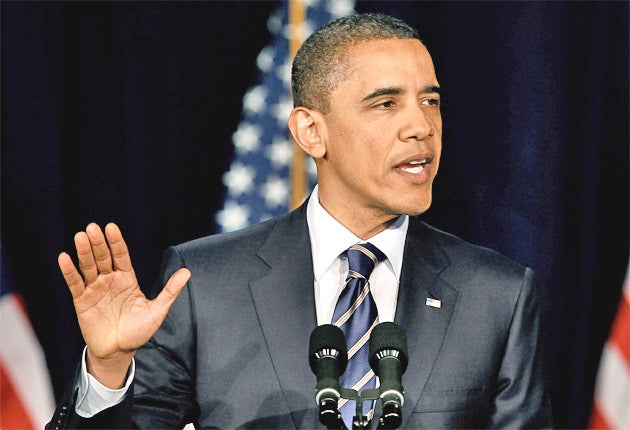Obama takes initiative in deficit debate with $4trn reduction plan

Your support helps us to tell the story
From reproductive rights to climate change to Big Tech, The Independent is on the ground when the story is developing. Whether it's investigating the financials of Elon Musk's pro-Trump PAC or producing our latest documentary, 'The A Word', which shines a light on the American women fighting for reproductive rights, we know how important it is to parse out the facts from the messaging.
At such a critical moment in US history, we need reporters on the ground. Your donation allows us to keep sending journalists to speak to both sides of the story.
The Independent is trusted by Americans across the entire political spectrum. And unlike many other quality news outlets, we choose not to lock Americans out of our reporting and analysis with paywalls. We believe quality journalism should be available to everyone, paid for by those who can afford it.
Your support makes all the difference.President Obama yesterday sought to seize the initiative in the debate on how to cut America's soaring debt by proposing reform of key entitlement programmes, coupled with higher taxes for the rich and an end to many of the loopholes that litter the US tax system.
Mr Obama set out his plan less than a week after a last-minute Congressional deal that trimmed $38bn from the 2011 budget averted a government shutdown. But this was a fleeting truce at best in an argument set to dominate next year's presidential campaign.
In a hastily arranged speech at George Washington University, the President set out his goal of reducing the federal deficit by $4trn over the next 10 to 12 years, bringing it down to around 2 per cent of gross domestic product by the end of the decade. That compares with a budget deficit currently running at more than $1.5trn annually, some 10 per cent of GDP.
Mr Obama's proposals were essentially the Democratic counter to a Republican blueprint presented last week by Paul Ryan, chairman of the House Budget Committee and one of the party's most influential economic policymakers.
The Ryan plan, titled "A Path to Prosperity," called for a $6trn reduction in federal spending over 10 years, including a radical restructuring of Social Security, Medicare and Medicaid, the giant federal entitlement programmes that account for nearly half of government spending. The Democrats have already rejected the proposals.
In an effort to give at least the impression of consensus-building, Mr Obama summoned congressional leaders of both parties to the White House before the speech to outline his proposals. But the gulf between Republicans demanding spending cuts and Democrats determined to defend social programmes – even if that means increasing taxes – looks unbridgeable.
The fiercest, but far from the only, point of contention is the future of the Bush-era tax cuts, which are due to expire at the end of 2012 having been extended at the end of last year. Mr Obama wants to end the cuts for Americans earning over $250,000. "We cannot afford $1trn worth of tax cuts for every millionaire and billionaire in our society. And I refuse to renew them again," he said. But for Republicans, that is a non-starter.
A further complication is the looming showdown over the authorisation of an increase in the federal debt ceiling, which stands at $14.3 trn. That ceiling will be hit some time in the next two months, at which point the government may have to default on some repayments.
In reality such an outcome, which would wreak havoc on global financial markets and send US interest rates soaring, is all but unthinkable. But that has not stopped the two parties engaging in a game of chicken, with Republican fiscal hardliners vowing to vote against any increase in the ceiling without further deep spending cuts.
Some common ground does exist. Both agree tax loopholes must be closed, while even Eric Cantor, the Republican majority leader in the House, has admitted that spending cuts alone will not get the country's finances back in order.
A compromise is already on the table in the form of a report delivered last November by the bipartisan debt reduction commission set up by Mr Obama. Its non-binding conclusions involve a mix of revenue increases – by raising some taxes and closing loopholes – spending cuts, and changes to entitlement programmes such as boosting Social Security contributions.
But any agreement is unlikely this side of the November 2012 election, in which Mr Obama is seeking a second term. The campaign will largely be fought over the competing proposals to put the government's financial house in order.
Any candidate for the Republican nomination must appeal to the fiscal and social conservatives who dominate the party's electorate. For his part, Mr Obama risks losing the support of liberal activists if he is seen to be caving in to Republican demands for cuts.
Join our commenting forum
Join thought-provoking conversations, follow other Independent readers and see their replies
Comments